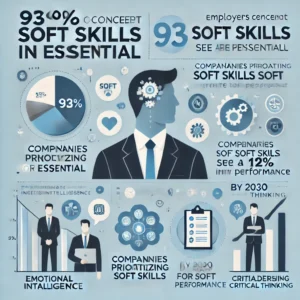From leadership and communication to adaptability and emotional intelligence, soft skills are now the top differentiator between high-performing employees and those who struggle to thrive.
In today’s fast-changing business world, technical skills alone no longer guarantee success. As industries embrace automation, artificial intelligence, and digital transformation, the most valuable professionals are those who bring something irreplaceable to the table—soft skills.
Why Are Soft Skills More Important Than Ever?
The numbers speak for themselves:
✅ 93% of employers consider soft skills essential or very important when making hiring decisions. (Wonderlic)
✅ Companies prioritizing soft skills training see a 12% increase in employee performance. (Boston Consulting Group)
✅ 89% of hiring managers say that lack of soft skills is the reason they reject candidates. (LinkedIn Workplace Learning Report)
✅ Employees with strong soft skills contribute to 30% higher productivity and retention rates in organizations. (McKinsey)
✅ By 2030, demand for soft skills is expected to grow by 22% across all industries. (Deloitte)
Clearly, professionals who invest in soft skills are future-proofing their careers while businesses that prioritize these competencies are securing long-term success.

Key Soft Skills Driving Business Success in 2025
1. Emotional Intelligence (EQ) – The Leadership Superpower
The ability to understand, manage, and influence emotions—both yours and others’—has become a must-have for leaders and employees alike.
🔹 90% of top performers have high emotional intelligence. (TalentSmart)
🔹 Employees with high EQ make $29,000 more per year on average. (Forbes)
🔹 Teams led by emotionally intelligent managers outperform competitors by 20%. (Harvard Business Review)
Companies investing in emotional intelligence training are seeing higher team morale, stronger collaboration, and improved decision-making—all of which drive business growth.
2. Communication – The Bridge to Success
Strong communication is at the core of teamwork, negotiation, and customer engagement. In a hybrid and remote work world, communication skills have never been more critical.
🔹 86% of employees cite poor communication as the reason for workplace failures. (Salesforce)
🔹 Companies that prioritize clear communication see a 25% increase in productivity. (McKinsey)
🔹 Effective communicators are 4.5 times more likely to succeed in leadership roles. (Gallup)
Whether in emails, meetings, or presentations, professionals who communicate with clarity and confidence will always stand out.
3. Adaptability – Thriving in Change
In an age of digital disruption, adaptability is non-negotiable. The ability to quickly adjust to new technologies, challenges, and ways of working is what separates thriving businesses from those that fall behind.
🔹 60% of CEOs say adaptability is the most important leadership skill in 2025. (PwC)
🔹 Employees who embrace change are 21% more engaged and 50% more productive. (Gartner)
🔹 Reskilling and adaptability training have reduced employee turnover by 39% in leading companies. (LinkedIn)
Professionals and organizations that continuously learn, unlearn, and relearn will stay ahead of the curve.
4. Critical Thinking – The Problem-Solving Edge
As automation takes over repetitive tasks, the ability to think critically is what makes professionals indispensable.
🔹 58% of employers say critical thinking is the most in-demand skill today. (World Economic Forum)
🔹 Companies that foster critical thinking see a 17% boost in innovation and problem-solving. (Harvard Business Review)
🔹 Leaders with strong analytical skills drive 23% higher revenue growth. (McKinsey)
In 2025 and beyond, the professionals who question, analyze, and innovate will lead the way.
5. Leadership – The Skill That Elevates Careers
Strong leadership isn’t just for managers—it’s for everyone. Taking initiative, inspiring others, and making strategic decisions set individuals and businesses apart.
🔹 83% of businesses say leadership development is critical to success. (Deloitte)
🔹 Companies that invest in leadership training are 2.4 times more likely to hit their financial goals. (Brandon Hall Group)
🔹 71% of employees say they would leave a company if their leader lacks vision. (Gallup)
Leadership isn’t just about titles—it’s about impact. Those who develop leadership skills open doors to higher career opportunities.
The Future of Work Belongs to Those Who Master Soft Skills
As businesses continue to automate and digitize, soft skills will remain the human advantage. While technical skills get you hired, soft skills help you grow, lead, and thrive.
Key Takeaways:
✔️ Companies that invest in soft skills see higher productivity, innovation, and employee satisfaction.
✔️ Emotional intelligence, communication, adaptability, and leadership are the most in-demand skills.
✔️ Professionals who continuously develop soft skills are more likely to succeed in leadership and high-paying roles.
As the workplace continues to evolve, one thing is certain—soft skills are the new power skills.
Sources & References:
📌 World Economic Forum: Future of Jobs Report
📌 Harvard Business Review: The Power of Soft Skills
📌 Deloitte: Leadership Trends 2025
📌 LinkedIn Learning Report: Skills for the Future
📌 McKinsey: The Impact of Soft Skills on Business Performance
📌 PwC: Workforce of the Future





